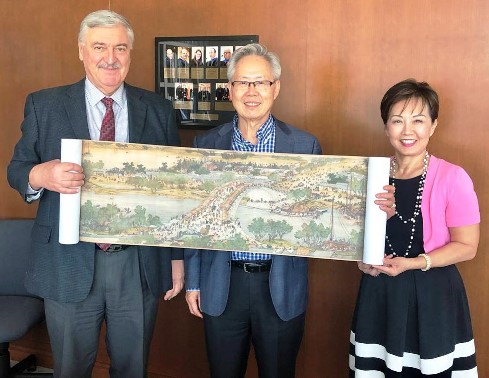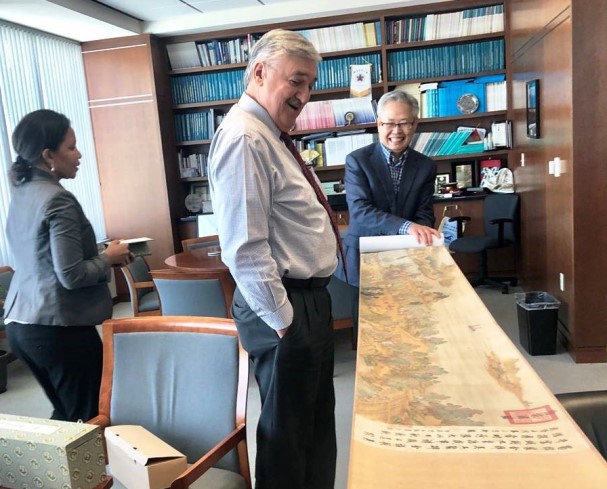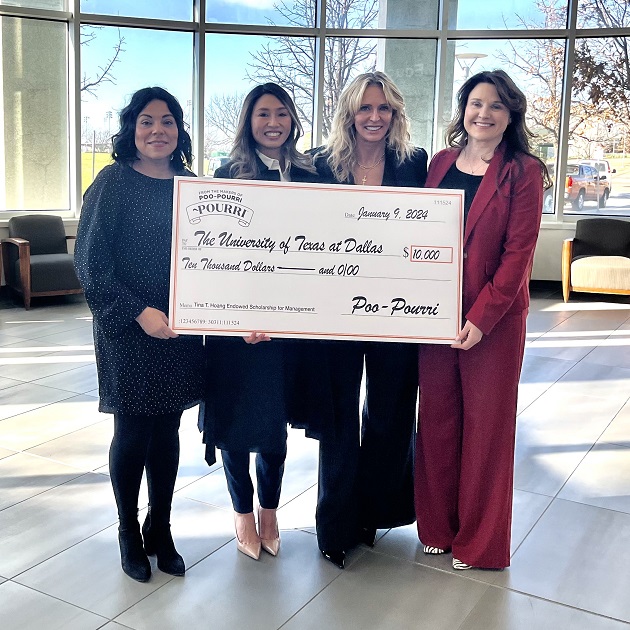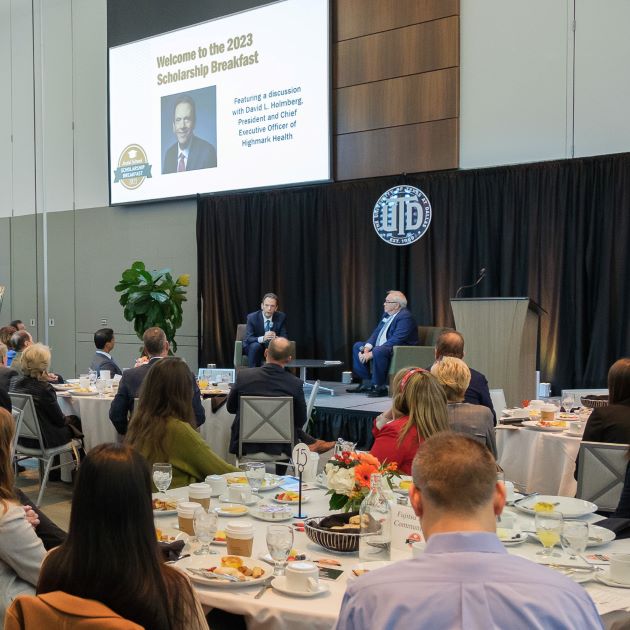From Friendship, a Gift
New art in the display case across from the main elevators on the first floor of the Naveen Jindal School of Management building came from Charlie W. Chen, an avid UT Dallas supporter whose many friends across campus include Jindal School Dean Hasan Pirkul.

A Richardson businessman and community activist, Chen gave the new work, a reproduction of a famous Chinese handscroll, Spring Festival Along the River, to Pirkul after they formed a friendship serving on the international committee of the Richardson Chamber of Commerce.
“I’m so glad that after we worked together … we became friends,” Chen said.
Since that time, the two have introduced many international business executives, dignitaries and academics to one another, and Chen has referred students to the Jindal School’s Executive MBA program.
Their initial pairing came in 2015 when Chen was serving as chairman of the Richardson Chamber, the first Asian American to do so.
The next year, he traveled home to his native Taiwan, where he visited the Palace Museum in Taipei together with another UT Dallas friend, Monique Wedderburn. Now at Graduate School USA in Honolulu, Wedderburn was then director of the UT Dallas Asia Center — a forerunner of the Center for Asian Studies — and worked in the Jindal School as well.
Friends Across Campus
By chance, Richardson businessman and UT Dallas supporter Charlie W. Chen sat next to then-UT Dallas president Dr. David E. Daniel on his 2016 flight home from Taiwan. Although Chen had met Daniel while serving as the Richardson Chamber of Commerce chairman in 2015 — the year Daniel was recognized as the 2014 Richardson Citizen of the Year — the flight gave them an opportunity to get better acquainted. And later, when Chen received the Richardson Citizen of the Year award for 2019, Daniel was in attendance.
Over the years, Chen has developed many long-standing relationships at UT Dallas. In 1992, he and his company participated at the opening of the Erik Jonsson School of Engineering and Computer Science building.
Later, Chen and his wife, Pauline, became friends with Dr. Dennis Kratz, then dean of the School of Arts and Humanities, who in 2019 became founding director of the UT Dallas Center for Asian Studies, and his wife, Dr. Abby Kratz, former UT Dallas associate provost. Both Chens now serve on the center’s International Advisory Council.
At JSOM, Chen has served on the advisory board for the Jindal School Center for Global Business, working closely with director Hubert Zydorek.
Drawn to Enduring Art — and Technological Advances
“After I had seen that scroll, I just came up with the idea that this will be a major gift for UTD,” Chen said.
Besides serving as general partner at C&P Properties, a commercial real estate investment company, Chen is CEO of DFW Technology, a Richardson-based information technology services company, and chairman of DFW Innovation Center. The advanced technological processes used to achieve the handscroll reproduction were part of what drew him to it.

“This was the most expensive version they published using the modern technology. The color will still be vivid over time, so it is very good for displaying,” Chen said. It was the first time that reproductions were produced in the same large size as the museum’s original version of the painting, and on a special high-tech fabric that resists fading.
The Qing Dynasty work, depicting various idealized scenes of life along the banks of a river, is a copy of the iconic Song dynasty scroll painting known as Qing Ming Shang He Tu (清明上河圖, Along the River During the Qingming Festival), by the artist Zhang Zeduan (張擇端), from the early 12th century, a national treasure.
Chen said that when he presented the handscroll to Pirkul at the end of 2018, the dean was surprised by its nearly 38-foot length. And on seeing the scroll unfurled, Pirkul suggested it be displayed in a long window, showing only a certain section at a time and then gradually unrolling it to display additional sections. Chen liked this idea, and in May 2020, the scroll was installed in a display case across from the main elevators on the first floor of the JSOM I building.





